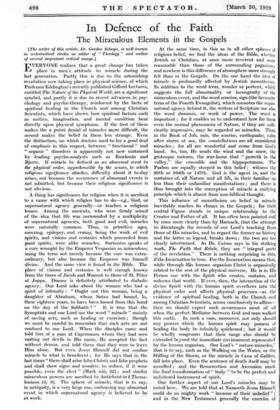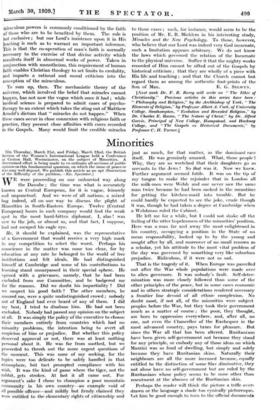In Defence of the Faith
The Miraculous Elements in the Gospels
[The writer of this article, Dr. Gordon Selwyn, is well known in ecclesiastical circles as editor of " Theology " and author of several important critical essays.] EVERYONE realizes that a great change has taken place in men's attitude to miracle during the last generation. Partly this is due to the astonishing revolution now taking place in physical science, of which Professor Eddington's recently published Gifford Lectures, entitled The Nature of the Physical World, are a significant symbol, and partly 'it is due to recent advances in psy- chology and psycho-therapy, reinforced by the facts of spiritual healing in the Church and among Christian Scientists, which have shown how spiritual factors. such as motive, imagination, and mental condition bear directly upon physical symptoms. If the first of these makes the a priori denial of miracles more difficult, the second makes the belief in them less strange. Even the distinction, on which doctors used to lay a good deal of emphasis in this respect, between " functional " and " organic " disorders is apparently not now sustained by leading psycho-analysts such as Baudouin and Bjerre. If miracle be defined as an abnormal event in the physical order, apprehensible by the senses, to which religious significance attaches, difficulty about it to-day arises, not because the occurrence of abnormal events is not admitted, but because their religious significance is not obvious.
A thing has significance for religion when it is ascribed to a cause with which religion has to do—e.g., God, or supernatural agency generally—or teaches a religious lesson. Among the ancients, who were firmly seized of the idea that life was surrounded by a multiplicity of supernatural agencies, both good and evil, miracles were naturally common. Thus, in primitive ages, sneezing, epilepsy, and cramp, being the work of evil spirits, and visions and ecstasies which proceeded from good spirits, were alike miracles. Suetonius speaks of a cure wrought by the Emperor Vespasian as miraculous, using the term not merely because the cure was extra- ordinary, but also because the Emperor was himself divine. And the same view is found in the Bible. The place of visions and ecstasies is well enough known from the times of Jacob and Manoah to those of St. Peter at Joppa. Disease is definitely attributed to diabolic agency. Our Lord asks about the woman who had a spirit of infirmity : " Ought not this woman, being a daughter of Abraham, whom Satan had bound, lo, these eighteen years, to have been loosed from this bond on the day of the Sabbath ? " It is true that the Synoptists and our Lord use the word " miracle " mainly of saving acts, such as healing or exorcism ; though we must be careful to remember that such acts are not confined to our Lord. When the disciples came and told him of a man at Capemaum whom they had seen casting out devils in His name, He accepted the fact without demur, and told them that they were to leave Him alone. But even Jesus Himself did not confine miracle to what is beneficent ; for He says that in the last times "there shall arise false Christs and false prophets and shall show signs and wonders, to seduce, if it were possible, even the elect " (Mark xiii, 22) ; and similar miraculous powers are ascribed to Antichrist in 2 Thessa- lonians (ii, 9). The sphere of miracle, that is to say, in antiquity, is a very large one, embracing any abnormal event in which supernatural agency is believed to be at work. At the same time, in this as in all other spheres of religious belief, we find the ideas of the Bible, whether Jewish or Christian, at once more reverent and mom reasonable than those of the surrounding paganism ; and nowhere is this difference of atmosphere more strongly felt than in the Gospels. On the one hand the idea of miracle is profoundly affected by Jewish monotheism. In addition to the word texas, wonder or portent, which suggests the full abnormality or incongruity of the miraculous event, and the word semeion, sign (the favourite term of the Fourth Evangelist), which connotes the super. natural agency behind it, the writers of Scripture use also the word dunamis, or work of power. The word is important ; for it enables us to understand how for them even -the normal phenomena of Nature, if they are suffi. ciently impressive, may be regarded' as miracles. Thus, in the Book of Job, rain, the sunrise, earthquake, calm after storm at sea, the constellations are all considered miracles ; for all are wonderful and come from God's hand. So, too, He sends the wind and the snow, the grotesque unicorn, the war-horse that " paweth in the valley," the crocodile and the hippopotamus. Thi Psalms are equally steeped -in this belief ; witness the 68th or 104th or 147th._ God is the agent in, and the sustainer of, all Nature and all life, in their familiar no less than their unfamiliar manifestations ; and there is thus brought into the conception of miracle a unifying principle which is absent from non-biblical thought.
This influence of monotheism on belief in miracle inevitably reaches its climax in the Gospels ; for their central Figure stands in unique relationship to the' Creator and Father of all. It has often been pointed out by none more clearly than by Harnack, that the attempt to disentangle the records of our Lord's teaching from those of His miracles, and to regard the former as history, and the latter as legend, breaks down ; the two are too closely intertwined. As Dr. Cairns says in his striking;. work, The Faith that Rebels, they are " integral parti of the revelation." There is nothing surprising in this if the Incarnation be true. For the Incarnation means that, while through Has human organism Christ is organically related to the rest of the physical universe, He is in His Person one with the Spirit who creates, sustains, and redeems that world. If ever, then, the interaction of the divine Spirit with the human spirit overflows into th4 physical order and affects physical processes—as the evidence of spiritual healing, both in the Church and among Christian Scientists, seems conclusively to affirm— then we should expect such occurrences most of all when the perfeet Mediator between God and man walked this earth. In such a case, moreover, not only should, any powers which the human spirit may possess of healing the body be infinitely quickened ; but it would be wholly congruous that their range also should be extended beyond the immediate environment represented by the human organism. Our Lord's " nature-miracles," that is to say, such as the Walking on the Water, or the Stilling of the Storm, or the miracle in Cana of Galilee, fall into place. Even the sentence of death itself may be annulled ; and the Resurrection and Ascension mark the final transformation of " body " to be the perfect and unfettered instrument of spirit.
One further aspect of our Lord's miracles may be noted here. We are told that at Nazareth Jesus Himself could do no mighty work " because of their unbelief " ; and in the New Testament generally the exercise of miraculous powers is commonly conditioned by the faith of those who are to be benefited by them. The rule is hot exclusive ; but our Lord's insistence upon it in. His teaching is such as to warrant an important inference. his is that the co-operation of man's faith is normally pecessary to the exercise of that divine activity which manifests itself in abnormal works of power. Taken in conjunction with monotheism, this requirement of human faith enables Christian theology to set limits to credulity, and imparts a rational and moral criticism into the conception of the miraculous.
To sum up, then. The mechanistic theory of the universe, which involved the belief that miracles cannot happen, has not now the vogue which once it had ; while edical science is prepared to admit cases of psycho- therapy to an extent which takes the sting out of Matthew Arnold's dictum that " miracles do not happen." When these cases occur in close connexion with religious faith or practice, they present close affinities with cures recorded in the Gospels. Many would limit the credible miracles to those cases ; such, for instance, would seem to be the position of Mr. E. R. Micklem in his interesting study, Miracles and the New. Psychology. To those, however, who believe that our Lord was indeed very God incarnate, such a limitation appears arbitrary. We do not know the laws which governed the relation of the Incarnate to the physical universe. Suffice it that the mighty works recorded of Him cannot be sifted out of the Gospels by historical criticism ; that they are wholly of a piece with His life and teaching ; and that the Church cannot but regard them as among the authentic foot-prints of the [Next week Dr. F. R. Barry will write on " The Ethic of Christianity." Previous articles in this series have been : " Philosophy and Religion," by the Archbishop of York, " The Elements of Religion," by Professor Albert A. Cock, of University College, Southampton, " Evolution and Revealed Religion," by Dr. Charles E. Raven, The Nature of Christ," by Dr. Alfred Garvie, Principal of New College, Hampstead, and Hackney College, and "The Gospels as Historical Documents," by Professor C. H. Turner.]



















































 Previous page
Previous page